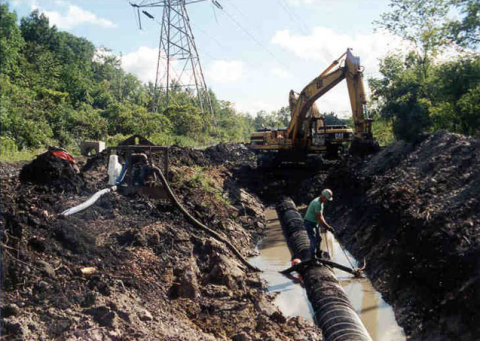
Above: A natural gas pipeline being constructed. Photo courtesy of the Federal Energy Regulatory Commission.
Just in time to celebrate Earth Day, the New York State Department of Environmental Conservation has announced that it has denied a water quality permit to the Constitution Pipeline.
The pipeline company had hoped to build a 124-mile natural gas pipeline across the northern Catskills from Pennsylvania to existing pipelines in Schoharie County, crossing Broome, Chenango and Delaware counties along the way.
In a press release issued on Friday, April 22, the DEC stated that the pipeline's application "fails to meet New York State’s water quality standards."
The DEC's ruling, issued on Earth Day, is a huge victory for anti-pipeline activists, who have ceaselessly petitioned Gov. Andrew Cuomo's administration to stop the pipeline's construction by denying it a state water permit, which is required by Section 401 of the federal Clean Water Act.
The Constitution Pipeline won federal approval in 2014, and immediately began aggressive eminent domain procedures along its Catskills route, forcing local landowners to allow the pipeline to cross their property.
The pipeline applied for the clean water permit from New York in 2015. The state had until April 29, 2016 to issue a decision--a year from the time Constitution initially applied for the permit.
In March, the pipeline announced that, due to New York's delay in issuing a permit, the pipeline project would also be delayed.
Now it is likely that another delay is in store. It is possible that the DEC's decision could prompt the pipeline to cancel the project entirely.
In a letter written today (see below), John Ferguson, the DEC's chief permit administrator at the agency's environmental permits division, stated that the pipeline's water permit application "fails in a meaningful way to address the significant water resource impacts that could occur from this Project and has failed to provide sufficient information to demonstrate compliance with New York State water quality standards."
In its press release, the DEC cited the pipeline's refusal to cooperate with the agency as one of the reasons for its decision:
Although DEC requested significant mitigation measures to limit affecting the state’s water bodies, this new right-of-way construction would impact approximately 250 streams across New York State. Many of those streams are unique and sensitive ecological areas, including trout spawning streams, old-growth forest, and undisturbed springs, which provide vital habitat and are key to the local ecosystems. DEC had repeatedly requested that Constitution provide a comprehensive and site-specific analysis of depth for pipeline burial to mitigate the project’s environmental impact – but the company refused – providing only a limited analysis of burial depth for 21 of the 250 New York streams.
Read the full press release from the DEC below:
New York State Department Of Environment Conservation Denies Water Quality Certificate Required For Constitution Pipeline
Today, officials from the New York State Department of Environmental Conservation announced the denial of the Clean Water Act Section 401 Water Quality Certification for the proposed Constitution Pipeline. Although DEC has granted certificates for other projects, the application by Constitution for these certificates fails to meet New York State’s water quality standards. The full decision is outlined in a letter by John Ferguson, Chief Permit Administrator with DEC’s Division of Environmental Permits and Pollution Prevention. That letter can be viewed here.
The Constitution proposal involved construction of approximately 124 miles of new interstate natural gas piping in northeastern Pennsylvania, proceeding into New York State through Broome, Chenango, Delaware, and Schoharie Counties, terminating at the existing Wright Compressor Station in Schoharie County.
In New York State, the project proposed to include new right-of-way construction of approximately 99 miles of new 30-inch diameter pipeline, rather than co-locating within existing rights-of-way. Although DEC requested significant mitigation measures to limit affecting the state’s water bodies, this new right-of-way construction would impact approximately 250 streams across New York State. Many of those streams are unique and sensitive ecological areas, including trout spawning streams, old-growth forest, and undisturbed springs, which provide vital habitat and are key to the local ecosystems.
DEC had repeatedly requested that Constitution provide a comprehensive and site-specific analysis of depth for pipeline burial to mitigate the project’s environmental impact – but the company refused – providing only a limited analysis of burial depth for 21 of the 250 New York streams. Pipes can become exposed in stream beds if not buried deeply enough, and corrective action can further damage the stream and impact water quality.
Additionally DEC received reports that landowners, possibly with Constitution's knowledge, clear cut old-growth trees along the right-of-way for the pipeline, including trees near streams and water bodies, even after the Federal Energy Regulatory Commission ruled that Constitution could not cut trees in the right-of-way.
State officials conducted a rigorous review of Constitution’s application, all supporting materials, and more than 15,000 public comments on the project before reaching this decision.












